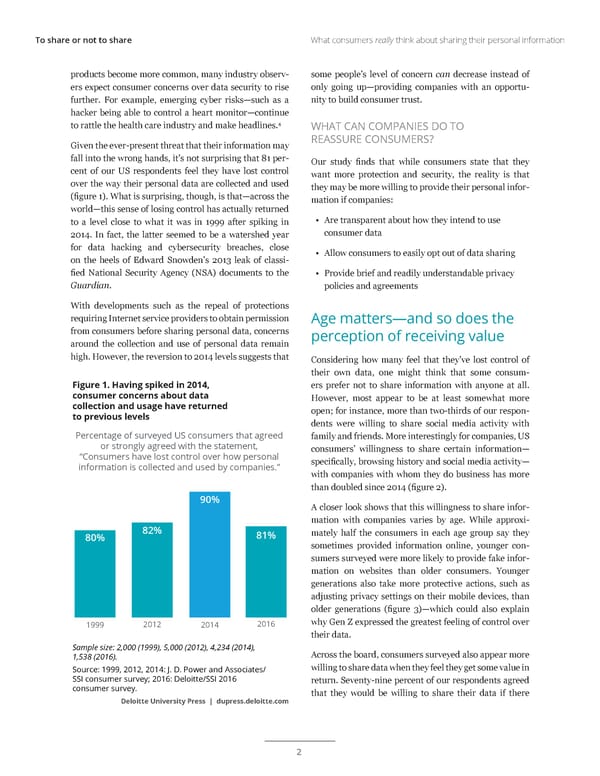To share or not to share What consumers really think about sharing their personal information products become more common, many industry observ- some people’s level of concern can decrease instead of ers expect consumer concerns over data security to rise only going up—providing companies with an opportu- further. For example, emerging cyber risks—such as a nity to build consumer trust. hacker being able to control a heart monitor—continue to rattle the health care industry and make headlines.4 WHAT CAN COMPANIES DO TO Given the ever-present threat that their information may REASSURE CONSUMERS? fall into the wrong hands, it’s not surprising that 81 per- Our study finds that while consumers state that they cent of our US respondents feel they have lost control want more protection and security, the reality is that over the way their personal data are collected and used they may be more willing to provide their personal infor- (figure 1). What is surprising, though, is that—across the mation if companies: world—this sense of losing control has actually returned to a level close to what it was in 1999 after spiking in • Are transparent about how they intend to use 2014. In fact, the latter seemed to be a watershed year consumer data for data hacking and cybersecurity breaches, close • Allow consumers to easily opt out of data sharing on the heels of Edward Snowden’s 2013 leak of classi- fied National Security Agency (NSA) documents to the • Provide brief and readily understandable privacy Guardian. policies and agreements With developments such as the repeal of protections requiring Internet service providers to obtain permission Age matters—and so does the from consumers before sharing personal data, concerns perception of receiving value around the collection and use of personal data remain high. However, the reversion to 2014 levels suggests that Considering how many feel that they’ve lost control of their own data, one might think that some consum- Figure 1. Having spiked in 2014, ers prefer not to share information with anyone at all. consumer concerns about data However, most appear to be at least somewhat more collection and usage have returned open; for instance, more than two-thirds of our respon- to previous levels dents were willing to share social media activity with Percentage of surveyed US consumers that agreed family and friends. More interestingly for companies, US or strongly agreed with the statement, consumers’ willingness to share certain information— “Consumers have lost control over how personal specifically, browsing history and social media activity— information is collected and used by companies.” with companies with whom they do business has more than doubled since 2014 (figure 2). 90% A closer look shows that this willingness to share infor- mation with companies varies by age. While approxi- 80% 82% 81% mately half the consumers in each age group say they sometimes provided information online, younger con- sumers surveyed were more likely to provide fake infor- mation on websites than older consumers. Younger generations also take more protective actions, such as adjusting privacy settings on their mobile devices, than older generations (figure 3)—which could also explain 1999 2012 2014 2016 why Gen Z expressed the greatest feeling of control over their data. Sample size: 2,000 (1999), 5,000 (2012), 4,234 (2014), Across the board, consumers surveyed also appear more 1,538 (2016). Source: 1999, 2012, 2014: J. D. Power and Associates/ willing to share data when they feel they get some value in SSI consumer survey; 2016: Deloitte/SSI 2016 return. Seventy-nine percent of our respondents agreed consumer survey. that they would be willing to share their data if there Deloitte University Press | dupress.deloitte.com 22
 DUP: To Share Or Not To Share Page 1 Page 3
DUP: To Share Or Not To Share Page 1 Page 3